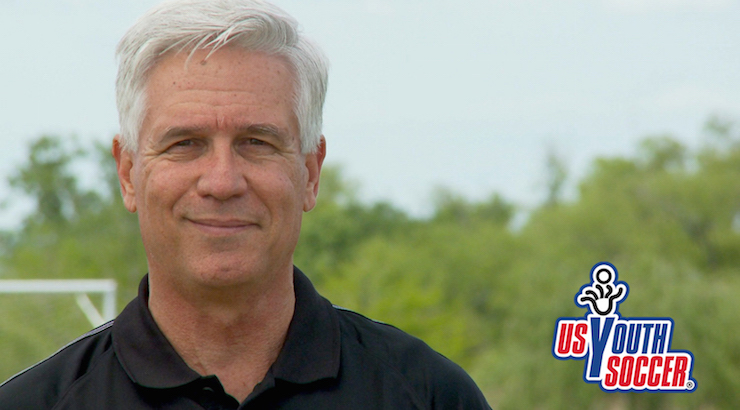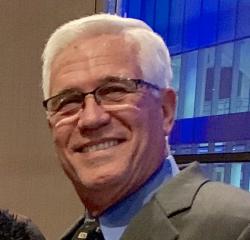US Youth Soccer Coaching Director Sam Snow
Shares His Views on Youth Player Development and Winning
In 2003, Sam Snow joined US Youth Soccer’s Technical Department as Assistant Director of Coaching Education following years spent in national, collegiate and youth education. This experience included positions as a U.S. Soccer National Staff Instructor and Director of Coaching for the Louisiana Soccer Association. Since 2004, Snow has assumed the leadership role in American youth soccer as Coaching Director for US Youth Soccer, and is responsible for the 55 state soccer associations in the USA.

Sam Snow is a tremendous advocate for proper player development, with a strong interest in the importance of small-sided games and “street soccer” to help players grow. He holds a USSF ‘A’ License, a National Youth License, and a Premier Diploma and National Goalkeeping Coaching License. Sam Snow is Soccer Nation News’s newest contributing columnist.
In response to SoccerToday’s current series on Development and Winning, Snow shared his thoughts on the state of youth soccer in America.
Youth Soccer Player Development vs. Winning at All Costs – Part 1
Youth Soccer Player Development vs. Winning at All Costs – Part 2
Rene Miramontes on Youth Soccer Player Development vs. Winning at All Costs
How do you balance player development and winning?
I don’t think they are mutually exclusive. Winning, or having a good chance at winning, is an outcome of good player development. Let’s be clear up front – always try to win. There’s nothing wrong with winning. It’s winning at any cost that is a problem. When the outcome of a match is more important than young players having the chance to perform, then a coach must take a step back. It’s the drive to win at the detriment of the players that is a problem in youth soccer today.
The difficulty for so many adults associated with youth soccer though is that player development takes a decade or more. The adults often lack the patience to let “soccer nature” take its course. So they have a “peak by Friday” mentality that focuses solely on the short-term results. One would think that adults could balance both short- and long-term goals in soccer, just as they do with the academic development of the very same kids.
One does not expect college level academic performance from third graders. We know that a general education must come first – foundations made from proper building blocks. Then as the student matures, he or she is eventually ready to focus on a major field of study in college. The exact same developmental pathway occurs in soccer. Players peak in their performance in their twenties to their thirties; some players will peak sooner and some later, just as happens in academics.
If soccer is only about win next weekend’s tournament, then it is a shallow life experience. Our intent must be to make soccer a lifetime sport.
How important is winning, and why do you feel this way?
Trying to win, to play your best, is always important. Every time you play, give it your all. But, if the team tried its best and still lost, that’s OK. A coach should be harder on his or her team when it played poorly but won than when it gave its all but lost. Striving for excellence is everything!
Quite naturally there’s disappointment after a loss and elation after a win. If a player can walk off the field saying that he or she gave it their very best, then they should be proud of the effort – win, lose or draw. This means focusing on the process of play, not merely the outcome.
“Winning is not everything, but making the effort to win is.” – Vince Lombardi

Do you believe a club’s reputation is impacted by their teams’ winning records?
Clearly, yes. The number of national championships won is an easy evaluation tool for parents to use in deciding on a club for their child. The won/loss record is a black and white way to evaluate a club and its coaches. However, it is a superficial evaluation.
I have often said that soccer is the cruelest of all team sports. We have all been in matches where we out-played and out-shot the opposition and still lost on the one counterattack goal. AND we have been that other team too. The score line does not always tell you how the game was played.
When parents are choosing a soccer club for their child they should ask deeper questions than just the number of trophies collected. Research the club, its administrators and coaches before deciding on a club in which to enroll your child. Do some thorough checking on the club, just as you would in deciding on a new car to buy.
When do you coach to win?
I try to coach my best at every game and with every age group. That’s what coaching to win means – give your team your best.
Does the question though imply that I coach to win at the detriment of the players or in a way that brings the game into disrepute? I consciously try to not ever do that with any team of any age or level of play.
But, if the question means when do some players stay on the field and others ‘ride the pine’ so that we can get the result, I may take that approach beginning around age 17. This of course will be with teams at a high level of play, say in the National League or competing in the National Championships Series. Still I must be wise about playing time, in that I need to build the depth of the team. So even at this level of play, I must get meaningful playing time for all of the players on the roster. I know that over the course of a soccer year I’ll need all of those players to be ready to perform come game day.
If your players did not pay to play, would you coach differently?
No. For any group of players do what you want them to do – give your best!
Do you have any other thoughts about winning and development?
The balance of developing the individual player, and then the team, with scoring more goals than the other team is a difficult one. Our societal drive to win is in fact a good thing; just look at what it does for our national teams. Yet listen to the comments of the national team coaches and the areas for needed improvement of the American player – especially ball skills. Our collective drive to win is a double edged sword. We have GREAT fighting spirit. But, grit alone doesn’t win games, at least not week in and week out. The passion for winning must be harnessed to acceptance of the fact that soccer, like all team sports, is a long-term developmental sport.
So we come back to the adult perspective of both short-term and long-term goals. There are four groups of adults who directly support the platform of youth soccer in our nation. In order of priority for player development they are parents, coaches, administrators and referees. When those four groups get the right balance of short- and long term-goals, then look out world!
I recommend that readers of SoccerNation News read the Vision document on the US Youth Soccer web site and the National Association for Sport and Physical Education position statement called Choosing the Right Sport and Physical Activity Program for your Child.






